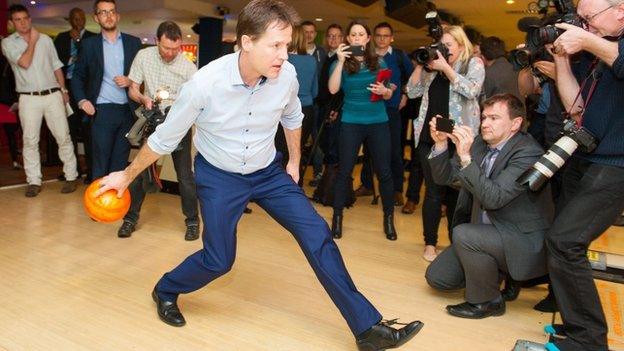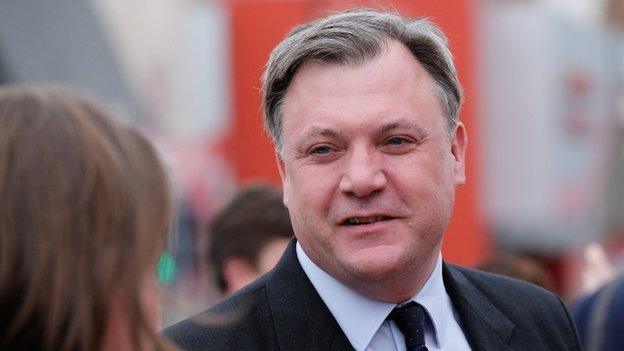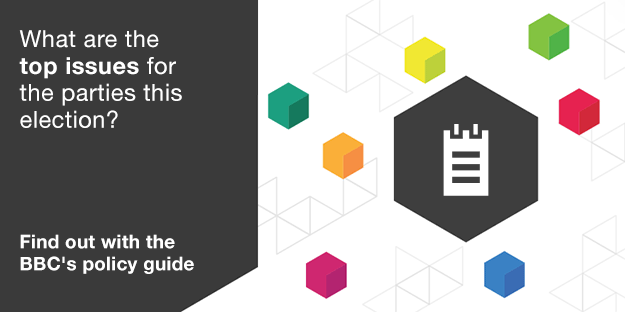Lib Dems face difficult election aftermath
- Published

Aiming for a strike on the campaign trail in Colchester
The hustings in Colchester has a comfortably old fashioned feel to it.
It's in a church hall and you can put 50p in a Tupperware box for a cup of tea and a biscuit, then sit on the sort of chairs they always have in church halls and judge how the candidates behind the trestle tables measure up.
The town, the oldest recorded in Britain, is a dot of Lib Dem yellow in a sea of Conservative blue.
The Lib Dems had a majority of just over 6,000 in 2010. The well-liked Lib Dem MP, Sir Bob Russell, has been here since 1997, and was a councillor for 20 years before that - a local fixture.
Before that it was always Conservative, and it is the sort of seat the Conservatives have to win to have a chance of forming a majority government.
In the hall, the very traditional format allows voters to ask a very contemporary question, central to this election and to the Lib Dem fortunes: can voters accept their makeover in the last five years, from party of protest to party of power?
One man in the front row, with a long white beard, asks how any politicians can be trusted - it is not just tuition fees he says, there is also the bedroom tax.
He tells me he voted Lib Dem last time because they weren't Labour or Conservative, but now they have blown it and he is very disillusioned.
Disappointment
Another lady who tells me she is gravely disappointed, later turns out to be a leading light in the local Green party.
She always voted for them in local elections, but for Lib Dems in General Elections - a tactical vote aimed at keeping the Tories out.

The Lib Dems hope to hold Colchester
But after the coalition deal she decided there was no point in doing that again, and so has joined the party of her real choice.
Now, random interviews with the public are not scientific.
Sir Bob is clearly very popular and there are lots of people who will vote for him on his local record.
There are people who will vote for him to keep the other lot out.
And there are people who think that going into coalition was the right thing to do, and it has been a success.
But let's face it: for years the Lib Dems were a leftish opposition party - picking up votes from people fed up with the Iraq War and Tony Blair and then Gordon Brown.
So for Nick Clegg, power has been a bargain with loss.
Just as Prince Hal assuming the throne decisively disowned the irresponsible companions of youthful indiscretion - Falstaff and the rest - so Nick Clegg had to make sacrifices.
Unfortunately for him, his choices meant abandoning not a fat old man - but many voters who didn't feel in sympathy with the new nostrums of a party of government.
It is hard to win back their sympathies.
Probable kingmakers
But losing votes is not the same as losing power.
Although there is rightly a lot of focus on the SNP it is still more likely that the Lib Dems would be the king makers in a hung Parliament. Indeed it is Mr Clegg's aim.
He has said his party would provide heart to the heartless Tories, head to thoughtless Labour.

Could Nick Clegg work with Ed Balls?
It's a good line, but has its dangers.
He may find it is yet another step further away from those leftish voters to suggest his party is now an indispensable part of any government, providing balance to the body politic.
Some might ask where that leaves the party's soul?
It may not be attractive to voters to claim they have become ultimate insiders - permanent power brokers who represent the even-handed golden mean of the indispensible establishment.
Even if seats like Colchester, with strong well-known MPs, stay Lib Dem, 8 May could be a difficult day for Nick Clegg.
All the opinion polls suggest he will lose seats.
That would be uncomfortable. But retaining influence, and exercising it, could be just as problematic.
A diminished Lib Dem party doing a deal with a Conservative party that has failed for a second time to win a majority would raise questions, not least from within the Parliamentary Party.
There will be those who find a deal with Labour more palatable.
But it would be strategically awkward.
After all, finding an allegedly heartless Conservative policy to block wouldn't be that difficult.
But how do you tell Ed that while he may have Balls you are now his brain?
Because, if 'brains' equals fiscal rectitude, insisting on more austerity, more cuts, may not be an easy sell on the doorstep when we go though this again in another five years.

The candidates for the Colchester constituency are:
Mark Goacher (Green)
Jordan Newell (Labour)
John Pitts (UKIP)
Will Quince (Conservative)
Bob Russell (Lib Dem)
Ken Scrimshaw (Christian Peoples Alliance)